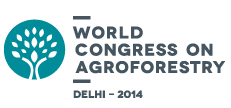Homegarden Agroforestry for Socio-Economic, Ecological and Environmental Sustainability in Sri Lanka
Homegarden Agroforestry for Socio-Economic, Ecological and Environmental Sustainability in Sri Lanka
wca2014-2484 DKNG Pushpakumara 1,*B. Marambe 1J. Weerahewa 1G.L.L.P. Silva 1K.T. Premakantha 2B.V.R. Punyawardena 3 1Faculty of Agriculture, University of Peradeniya, Peradeniya, 2Forest Department, Battaramulla, 3Department of Agriculture, Peradeniya, Sri LankaHomegardens in Sri Lanka has been described as the oldest land use activity, next only to shifting cultivation. It is one of the major forms of land use in the island that has been evolved through generations within the available resource frontiers to suit the socio-economic, cultural and ecological needs. Though, this land use system existed in Sri Lanka for centuries, and claimed to account for 13.1% of the total land area of the country, it started receiving the national recognition only recently. During the past two decades, numerous studies have been conducted on homegarden systems by researchers from various disciplines. Having realized the importance of homegardens, the national development plan has now included strategies to expand and improve food and timber productions in such landscapes of Sri Lanka. Development of homegardens in Sri Lanka has been the priority of many development programmes implemented over the past few years; among them strengthening of 1.5 million homegardens was the target of “Divi Neguma” (Livelihood Development) programme in order to achieve self-sufficiency in vegetables and to reduce vegetable prices. Hence, Sri Lanka is a country to declare a national program for improvement of homegarden agroforestry. Parallel to such development, this paper shows how homegarden land use system plays a critical role in agricultural, ecological and environmental sustainability of the country and how beneficial homegardens are to socio-economic development of the human well-being. Strategies to achieve such goals of the country and the critical gaps exist and mechanisms to overcome such gaps are discussed in detail.

